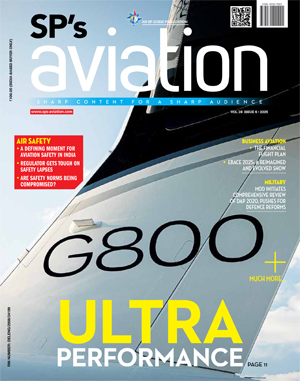INDIAN ARMED FORCES CHIEFS ON OUR RELENTLESS AND FOCUSED PUBLISHING EFFORTS

The insightful articles, inspiring narrations and analytical perspectives presented by the Editorial Team, establish an alluring connect with the reader. My compliments and best wishes to SP Guide Publications.

"Over the past 60 years, the growth of SP Guide Publications has mirrored the rising stature of Indian Navy. Its well-researched and informative magazines on Defence and Aerospace sector have served to shape an educated opinion of our military personnel, policy makers and the public alike. I wish SP's Publication team continued success, fair winds and following seas in all future endeavour!"

Since, its inception in 1964, SP Guide Publications has consistently demonstrated commitment to high-quality journalism in the aerospace and defence sectors, earning a well-deserved reputation as Asia's largest media house in this domain. I wish SP Guide Publications continued success in its pursuit of excellence.
- The layered Air Defence systems that worked superbly, the key element of Operation Sindoor
- Operation Sindoor | Day 2 DGMOs Briefing
- Operation Sindoor: Resolute yet Restrained
- India's Operation Sindoor Sends a Clear Message to Terror and the World – ‘ZERO TOLERANCE’
- Japan and India set forth a defence cooperation consultancy framework, talks on tank and jet engines
49 per cent FDI a far cry

NEWS
There seems to be little enthusiasm among international airlines over the government’s plan to allow them to pick 49 per cent stake in their Indian counterparts. In spite of a high and sustained growth in passenger traffic, the financial strength of almost all Indian airlines is severely affected leading foreign carriers to be disinclined to invest at the moment. Top aviation officials who met at the 68th annual meet of the International Air Transport Association (IATA) in Beijing mid-June, spoke about strict regulations, lack of reforms and the Indian Government backing Air India as factors which came in the way of the competition.
VIEWS
The Indian Government’s much talked about and long-awaited but yet to be announced decision to allow foreign direct investment (FDI) by foreign airlines in the Indian air carriers was indeed discussed at length during the recently held International Air Transport Association’s 68th annual meet in Beijing. It may be recalled that a proposal to allow foreign carriers to own up to 49 per cent in Indian airline companies has been pending for months now for consideration by the Indian Cabinet because of political opposition. But even if the political consensus came through allowing the Indian Government to tweak the policy as planned, there seems to be no guarantee that it would open the floodgates for foreign airlines rushing in to invest in the Indian carriers. Views expressed by the leaders/CEOs of international carriers during the Beijing conference amply proved the point. Their collective views were brought out comprehensively by Tim Clark, President Emirates during a recent interview to an Indian newspaper. “India’s proposed policy to allow global airlines to acquire equity stakes in domestic airlines is rational as these carriers have much to offer in terms of expertise, connectivity and convenience. However, a change in the FDI policy alone will not suffice to attract investments. Investors in addition would need the comfort of a ‘ring fence’. Why would a foreign airline infuse capital in a cashstrapped Indian airline company like Kingfisher or Air India unless its investment is protected?” According to Clark, the Indian Government should offer foreign airlines some incentives; a clean balance sheet, no debts, firewalls against interference and freedom to procure assets in a transparent way.
From the above, it is abundantly clear that much more would have to be done by the Ministry of Civil Aviation (MoCA) to attract FDI infusion into the Indian civil aviation market, if it is really serious to help domestic airlines which are struggling hard to stay afloat amidst worsening financial woes. Kingfisher and Air India are already on the brink, but all other airlines barring perhaps the low-cost IndiGo are running in the red. But poor management cannot be the sole reason for their financial ill-health as it is being attributed by some aviation pundits and especially the ones belonging to the government circles. Actually, much of the problem has been created by the government itself, which by taking fragmented and at times irrational decisions has literally axed the growth of what was emerging as one of the fastest growing sectors in the country.
At the heart of the problem lies the skewed aviation turbine fuel (ATF) pricing policy of the government. India’s ATF market is afflicted by anti-competitive practices largely due to the oligopolistic environment created by the government-owned companies which supply it to the domestic airlines; that too in a manner which is anything but transparent. For example domestic airlines are paying at least 50 per cent more for the ATF in India compared with places like Singapore and Sharjah. In addition, a differential policy is followed for jet fuel whereby it costs less for international flights than domestic flights. What could possibly be the reason for this inexplicable disparity, unless it has something to do with the government mindset that anybody who flies within India has to be from a rich background and therefore can be discriminately taxed.





